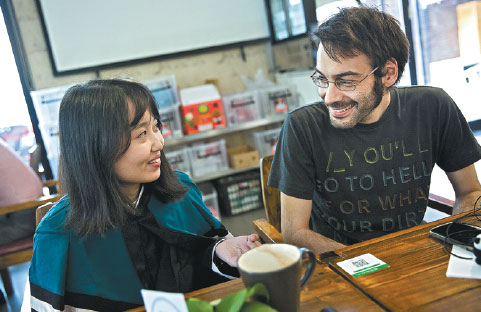Low salaries leave expat teachers bottom of class
Updated: 2015-07-23 07:39
By Zhao Xinying(China Daily)
|
|||||||||||
|
A language teacher from Italy (right) chats with a student who plans to study in Milan. [Photo by Chen Xiaodong / for China Daily] |
Market forces
In 2014, SAFEA cancelled the national salary standard and authorized its branches in different provinces and regions to set their own standards based on local social and economic conditions.
"The salaries paid to foreigners will be decided by local market factors. But in principle, they should not be lower than the average salaries of the local people," SAFEA said in a notice.
According to Bao, from the Beijing Foreign Studies University, the change of policy has resulted in a situation where hiring and firing are now a two-way street for both parties: The schools select the teachers and the teachers select the schools, and both parties are on the lookout for the most rewarding deal.
"It's natural for foreign teachers to switch to other schools, tutorial classes or training organizations that can provide better benefit packages than publicly funded schools," she said.
In an attempt to retain foreign teachers, Bao has made a number of appeals to persuade BFSU to raise their salaries. So far, her calls have not been heeded.
"The university now mainly focuses on inviting and employing high-level foreign experts and talent, and some project funds have been ringfenced for that purpose, but there's very little preferential treatment given to the average foreign teacher nowadays," she said.
Bao's observation was echoed by Wang Huiyao, director of the Center for China and Globalization, a think tank in Beijing. "It's a common strategy in many countries now to offer top-class benefit packages to leading talent from across the world, including prominent lecturers, professors and experts.
"But we should also care more about the regular foreign teachers who work on the front line, because they are the ones who face large groups of Chinese students and who determine the quality of teaching in general," Wang said.
Some schools have already taken action. Wu, from XISU, said that last year the university authorities agreed to 20 percent raise in the monthly salaries of foreign teachers.
"It's still not enough, though," he said. "There's still a great deal to be done to ensure these teachers stay with us."
Zheng Jinran contributed to this story.
Contact the writer at zhaoxinying@chinadaily.com.cn
Today's Top News
Greek parliament passes crucial bailout bill
Shanghai says no futures trading manipulation in FTZ
'Spartans' detained by Beijing police for disturbing order
More Chinese companies become world top 500
Another month, another global heat record broken
Forbidden City enters Secret Garden for different shade
Chinese soccer player Zhang joins Spanish club on loan
Navy starts exercise in S. China Sea
Hot Topics
Lunar probe , China growth forecasts, Emission rules get tougher, China seen through 'colored lens', International board,
Editor's Picks

|

|

|

|

|

|







